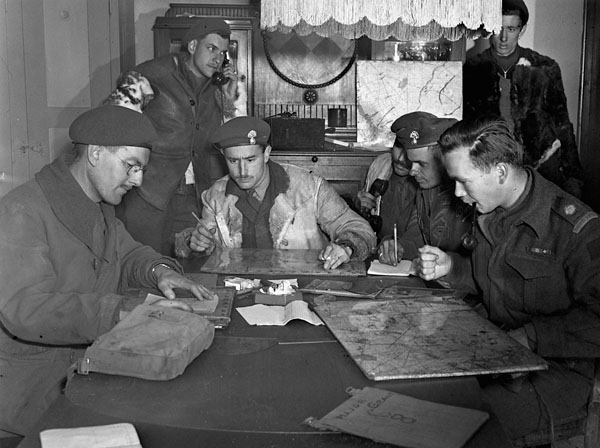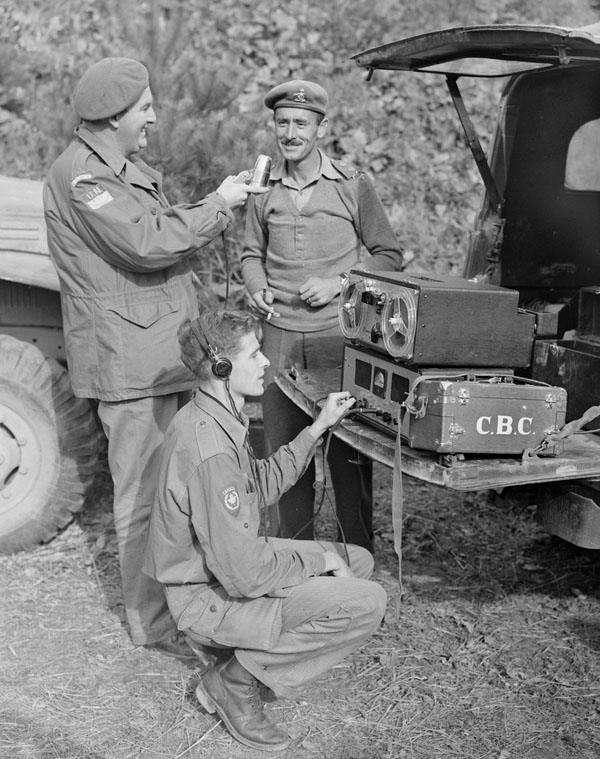Jacques Alfed Dextraze (“Jadex”), CC, CCM, CBE, DSO and Bar, CD, businessman, soldier (born 15 August 1919 in Montreal, QC; died 10 May 1993 in Ottawa, ON). During the Second World War, Dextraze rose from private to lieutenant-colonel commanding an infantry battalion; he was decorated twice for bravery. He returned to civilian life after the war but was recalled for Korea, where he again commanded an infantry battalion. Dextraze remained in the army after the war and rose through the ranks to become chief of the defence staff from 1972 to 1977.

Early Life and Education
Jacques Dextraze was the son of Jacques Dextraze and Amanda Bond. Between 1930 and 1937, he was educated at Saint-Joseph College, a boarding school in Berthierville, Quebec. When Dextraze finished school, he joined the Dominion Rubber Company as an office boy.
Second World War
In 1939, Jacques Dextraze enrolled as a private in the 2nd Battalion, Les Fusiliers Mont-Royal (Fus MR), a reserve unit. In 1940, he transferred to the unit’s active battalion, which was overseas; Dextraze remained in Canada for training and was quickly promoted corporal and then sergeant. Dextraze then attended the Officers Training Centre at Brockville, Ontario, and graduated in 1942 as a lieutenant. While he was on course, the Fus MR was decimated during the Dieppe Raid of 19 August. Dextraze was a designated replacement, but before he sailed for Britain, he married Françoise Pare on 2 September. They later had four sons.
Europe
Dextraze’s first appointment in the Fus MR was battalion intelligence officer before he was promoted captain. He was promoted major in 1943 and given command of A Company. In July 1944, Major Dextraze landed in Normandy with his company. On 1 August, he was ordered to capture the church in St. Martin-de-Fontenay, which the enemy was using as an observation post.
As Dextraze’s company made its way through the village streets, his assault platoon’s commander was killed, and the leading elements were stopped by heavy machine-gun and mortar fire. It was vital to maintain momentum, so Dextraze rushed forward to the churchyard wall. From there, he got his men into the churchyard.
Dextraze set the example in the tough hand-to-hand fighting that followed. The Canadians captured the church, but the Germans soon counterattacked. Dextraze quickly organized an effective defence, held the Germans back and secured the church. He was awarded the Distinguished Service Order for his courage, second only to the Victoria Cross.
Commanding Officer
Dextraze and the Fus MR fought through the rest of the Normandy Campaign and on into Belgium and the Netherlands. On Christmas Day 1944, Dextraze was promoted lieutenant-colonel and appointed commanding officer of the Fus MR.
On 16 April 1945, Dextraze was ordered to clear the Germans from the eastern half of the Dutch city of Groningen. As the enemy had occupied Groningen in force, tough house-to-house fighting followed. Early in the battle, Dextraze’s leading troops were held up by heavy machine-gun fire. He immediately went forward to their position, made a plan to clear the machine-gun posts and directed his leading company in a successful attack.
Thirty minutes later, Dextraze’s right company was held up by enemy fire and its commander killed. He again went forward, reorganized the attack and personally led the company to success.
One last German stronghold remained. Dextraze decided to demand the surrender of the enemy. He pointed out the hopelessness of the situation to the German commander and negotiated the surrender of the entire garrison. Dextraze was awarded a second Distinguished Service Order for his contributions to the garrison’s capitulation.
Postwar
Although the war ended in Europe in May 1945 (see VE-Day), the conflict with Japan continued. On 17 May 1945, the Canadian government approved the Canadian Army Pacific Force (CAPF), which included the 6th Canadian Division. (See Canada and the Asia-Pacific War.)
The division was organized along U.S. Army lines and used the names of infantry battalions from 1st Division. Jacques Dextraze volunteered for the CAPF and was selected to command the Hastings and Prince Edward Regiment. In August, however, the atomic bombs were dropped on Japan, ending the war; the CAPF was disbanded. (See VJ-Day and Canada and the Manhattan Project.)
Dextraze returned to civilian life and worked for the Singer Sewing Machine Company as a logger in the company lumber town of Thurso, Quebec. The company soon recognized his leadership talents and appointed him woodlands manager.

Korean War
In 1950, Jacques Dextraze was recalled from his civilian career to train and command the 2nd Battalion, Royal 22e Regiment, for the Korean War. While training at Fort Lewis, Washington, Dextraze acquired the nickname by which he was identified for the rest of his life. He initialled his paperwork JDX, which shortly evolved into Jadex.
Dextraze and his unit entered the front line in Korea in May 1951. It was a war of static hilltop defensive positions, frequent patrols and repelling enemy attacks. Dextraze and his men fought their major battle at Hill 355 between 22 and 25 November.
During this period, Dextraze and his soldiers endured repeated Chinese attacks and artillery barrages during appalling weather. His leadership contributed to the hard-won victory, epitomized by his straightforward instructions to his men: “No withdrawal. No platoons overrun. No panic.”
Dextraze was appointed to the Most Excellent Order of the British Empire “in recognition of gallant and distinguished service in Korea.”
Staff Appointments
Jacques Dextraze remained in the army after Korea and was posted to the Canadian Army Command and Staff College in Kingston, Ontario. On promotion to colonel in 1952, he was appointed commandant of the Royal Canadian School of Infantry in Camp Borden, Ontario.
In 1954, Dextraze became commander of Camp Valcartier in Quebec. Between 1954 and 1962, he held various staff positions as a colonel. In 1962, Dextraze was promoted brigadier general and appointed commander Eastern Quebec Area with headquarters in Quebec City.
Congo
In December 1963, Jacques Dextraze arrived in the Republic of the Congo as chief of staff of the United Nations mission there, known as ONUC. When the former Belgian colony attained its independence, the resulting power vacuum led to violence throughout the country.
When reports of widespread atrocities reached ONUC headquarters, Dextraze issued orders to his small contingent of UN troops to evacuate noncombatants from the danger zones. Beginning on 16 January 1964, hundreds of civilians were rescued over the next few weeks. For his “outstanding qualities in planning, leadership and command” during the mission, Dextraze was promoted within the Most Excellent Order of the British Empire to the grade of commander with oak leaf cluster for bravery, the only Canadian so honoured.
Higher Appointments
On return from the Congo later that year, Jacques Dextraze became commander 2nd Canadian Infantry Brigade in Camp Petawawa, Ontario. He remained there until 1966, when he became chief of staff (operations and training) at Mobile Command Headquarters in St-Hubert, Quebec. Dextraze was promoted major-general the next year and remained at Mobile Command as deputy commander.
In 1968, Dextraze was posted to National Defence Headquarters (NDHQ) in Ottawa as deputy chief of policy and resources management.
Chief of the Defence Staff
In 1971, Jacques Dextraze was promoted lieutenant-general and remained at NDHQ as chief of personnel. On 15 September 1972, he was promoted general and appointed chief of the defence staff (CDS), the senior military position in the Canadian Armed Forces (CAF). As such, he was appointed the principal Commander of the Order of Military Merit.
Dextraze was CDS during the Liberal government of Pierre Elliott Trudeau, which was not particularly supportive of the military. Among other reductions, the 1970 White Paper called for the elimination of tanks from the army. Dextraze convinced Trudeau and his cabinet that tanks were essential to the army’s NATO commitment in Europe.
Meanwhile, Dextraze had been working behind the scenes with the West Germans. When Cabinet approved new tanks, a process was already in place to first loan and then buy Leopard tanks from the Germans for the armoured regiment based in West Germany. (See Canadian Forces in Europe During the Cold War.)
Dextraze remained CDS for five years until 31 August 1977, when he retired.
Civilian Career
In January 1978, Jacques Dextraze was made a Companion of the Order of Canada. In retirement, he became chairman of the Canadian National Railway, a position he held until 1982.
Death and Legacy
When Jacques Dextraze died of cancer in 1993, he was buried beside his youngest son, Richard, in Montreal’s Notre-Dame-des-Neiges Cemetery. Richard, a U.S. Marine Corps lance corporal, had been killed in Vietnam on 23 April 1969. For his bravery during a fierce firefight, Richard was awarded a posthumous Silver Star Medal. When Dextraze’s wife, Francis, died in 2003, she was buried with her husband and son.
Jacques Dextraze is the only member of the CAF to be promoted from the lowest to the highest rank, joining as a private in the Canadian army in 1939 and retiring as chief of the defence staff in 1972.

 Share on Facebook
Share on Facebook Share on X
Share on X Share by Email
Share by Email Share on Google Classroom
Share on Google Classroom













